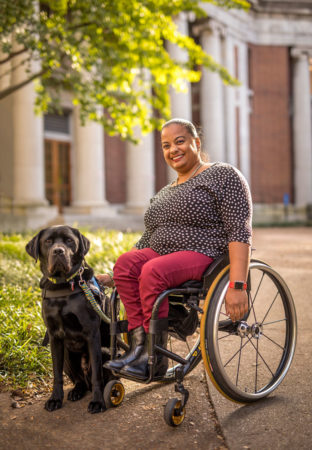The COVID-19 pandemic has induced stress in everyone this year, but for those marginalized by disabilities, and especially those already dealing with social inequity and poverty, the pandemic has dealt additional blows.

In a November article published in Rehabilitation Psychology, Anjali J. Forber-Pratt, assistant professor of human and organizational development, reviews research on disabilities and COVID-19 to help rehabilitation psychologists mitigate the effects of the added stress of the pandemic. In addition, the work addressed how systemic discrimination against people with disabilities intersects with other forms of inequity.
Forber-Pratt co-authored the research with lead author Emily M. Lund, an assistant professor in the Department of Educational Studies in Psychology, Research Methodology and Counseling at the University of Alabama; Catherine Wilson, a board-certified rehabilitation psychologist; and Linda R. Mona, who is with the VA Long Beach Healthcare System.
“As disabled people and scholars ourselves, we noticed that the disability community, including disabled people with multiple marginalized identities, were being uniquely impacted by the pandemic, and that their stories were often being pushed to the side,” Lund said. “We wanted to document what our communities are experiencing.”
Forber-Pratt, who holds secondary appointments as assistant professor of special education at Peabody and assistant professor of physical medicine and rehabilitation at the School of Medicine, said people with disabilities are facing additional barriers and concerns during the COVID-19 pandemic due to longstanding patterns of discrimination and marginalization. “Our research examines the physical, mental, social and economic implications of the pandemic on people with disabilities and provides solutions for the disabled community, as well as for psychologists working with these clients, during this time,” she said.
People with disabilities account for more than 25 percent of American adults, making them one of the largest marginalized groups in the United States. Yet research shows they are routinely left out of conversations about social policy having to do with disabilities, which perpetuates discrimination, particularly in social institutions—including health care. The pandemic has stoked fears about health care rationing and concerns that in-person care for daily needs and assistive technology used by those with disabilities could be declared nonessential by governing bodies. In addition, those with developmental disabilities often live in group homes and other congregate settings where there is an increased risk of the spread of COVID-19. Prolonged isolation due to physical distancing and the restriction of visitors to group settings has increased depression and exacerbated cognitive, physical and mental health issues.
Those with disabilities are already more likely to be economically disadvantaged by increased medical costs, and they are three times more likely to be unemployed. As a result, the pandemic has exacerbated poverty among this group. In addition, issues of racial inequity in the health care system and other societal institutions has caused trauma and stress in the disabled community to rise disproportionally during the pandemic.
In their review of the research, the authors found strategies for addressing these stressors with their clients. While those in the general population and those with disabilities can benefit from some of the same self-care activities that have been encouraged during the pandemic (being physically active, finding virtual connections with family and friends, and seeing a mental health professional for support, to name a few), rehabilitation psychologists can help their clients create disability-specific strategies for coping. Planning ahead for communication needs, back-up caregivers, medical supplies and food delivery was found to be therapeutic for the client in and of itself.
Research confirms that instilling pride in individuals who identify as disabled, known as disability-affirmative therapy, has been found to lessen the negative effects of stigma. And psychologists can look for opportunities for advocacy in combating discrimination against the disabled through legislative and political means, through social media and within the profession.
“While systemic ableism and racism are not new, it is hoped that rehabilitation psychologists and other professionals working with disabled clients can better understand the unique challenges and stressors facing those of us with disabilities during the pandemic,” said Forber-Pratt. “Further, we need professionals to take this awareness and turn it into action advocating for disabled clients, naming these additional stressors and helping to work together toward solutions.”
Lund added, “The disability community has experienced—and continues to experience—a lot of discrimination and trauma, and we are also proud and resilient. The world needs to recognize all of that.”
Read “The COVID-19 Pandemic, Stress, and Trauma in the Disability Community: A Call to Action”
Watch an Ask an Expert video with Forber-Pratt about the challenges people with disabilities face during the pandemic.